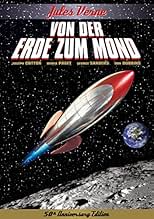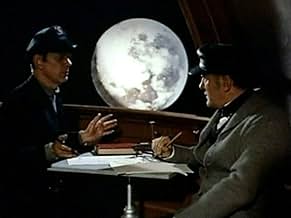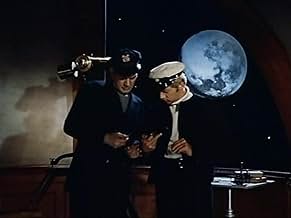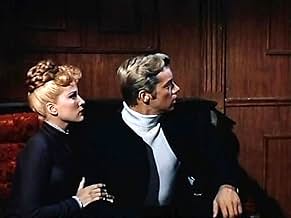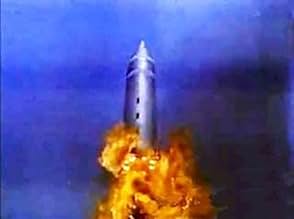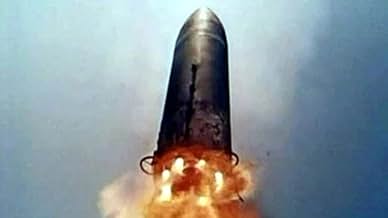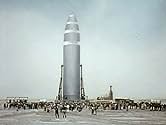VALUTAZIONE IMDb
5,1/10
1895
LA TUA VALUTAZIONE
Nel 1868, l'inventore americano Victor Barbicane sviluppa un potente esplosivo militare che usa anche come carburante per un razzo diretto sulla luna guidato da lui stesso e da un equipaggio... Leggi tuttoNel 1868, l'inventore americano Victor Barbicane sviluppa un potente esplosivo militare che usa anche come carburante per un razzo diretto sulla luna guidato da lui stesso e da un equipaggio eterogeneo.Nel 1868, l'inventore americano Victor Barbicane sviluppa un potente esplosivo militare che usa anche come carburante per un razzo diretto sulla luna guidato da lui stesso e da un equipaggio eterogeneo.
- Regia
- Sceneggiatura
- Star
Ludwig Stössel
- Aldo Von Metz
- (as Ludwig Stossel)
Morris Ankrum
- US President
- (non citato nei titoli originali)
Robert Clarke
- Narrator
- (voce)
- (non citato nei titoli originali)
Les Tremayne
- Countdown Announcer
- (non citato nei titoli originali)
Recensioni in evidenza
After the Civil War, arms inventor Victor Barbicane (Joseph Cotten) creates a super explosive he calls Power X. But he faces public opposition from steel manufacturer Stuyvesant Nicholl (George Sanders), a supporter of the Confederacy who has an irrational hatred of Barbicane. After being forbidden from using his formula by President Ulysses S. Grant, Barbicane turns to building a spaceship that will be shot to the moon by a cannon. And he needs his arch-rival Nicholl's help to do it.
I'm perplexed as to why this one is so hated on here. At first I thought maybe it was Mystery Science Theater 3000, which is often to blame when you see an older movie on IMDb with a lot of negative reviews and a lower than deserved score. But it doesn't appear this was featured on that show. Many of the reasons given in the reviews I've read here could fit a dozen other respected sci-fi films from the same era. Complaining that the movie has dated special effects? Really? The only reason I don't rate it higher myself is because it's basically 100 minutes of the rivalry and reluctant partnership between these two men with nothing much in the way of sci-fi spectacle that you expect from a movie based on a Jules Verne novel. But those men are Joseph Cotten and George Sanders, who both give charismatic performances. This wasn't challenging stuff for either actor, and both have certainly done better, but they do very well with what they're given here. Debra Paget (with dyed blonde hair) is largely wasted. Fantastic job by Morris Ankrum in his one scene as President Grant. There isn't much in the way of effects but the little bit there is has the kind of quaint charm to it that I enjoy about period sci-fi films. Like I said, I don't get the fervent hatred of this movie. It's not one of the great sci-fi films from the Golden Age, nor is it the best Verne adaptation brought to the screen, but it's not a terrible film. It's actually quite enjoyable and a good way to pass the time. Love that final corny scene. It's a good corny, in my opinion.
I'm perplexed as to why this one is so hated on here. At first I thought maybe it was Mystery Science Theater 3000, which is often to blame when you see an older movie on IMDb with a lot of negative reviews and a lower than deserved score. But it doesn't appear this was featured on that show. Many of the reasons given in the reviews I've read here could fit a dozen other respected sci-fi films from the same era. Complaining that the movie has dated special effects? Really? The only reason I don't rate it higher myself is because it's basically 100 minutes of the rivalry and reluctant partnership between these two men with nothing much in the way of sci-fi spectacle that you expect from a movie based on a Jules Verne novel. But those men are Joseph Cotten and George Sanders, who both give charismatic performances. This wasn't challenging stuff for either actor, and both have certainly done better, but they do very well with what they're given here. Debra Paget (with dyed blonde hair) is largely wasted. Fantastic job by Morris Ankrum in his one scene as President Grant. There isn't much in the way of effects but the little bit there is has the kind of quaint charm to it that I enjoy about period sci-fi films. Like I said, I don't get the fervent hatred of this movie. It's not one of the great sci-fi films from the Golden Age, nor is it the best Verne adaptation brought to the screen, but it's not a terrible film. It's actually quite enjoyable and a good way to pass the time. Love that final corny scene. It's a good corny, in my opinion.
After TWENTY THOUSAND LEAGUES UNDER THE SEA and AROUND THE WORLD IN EIGHTY DAYS it is most likely that the most popular of Jules Verne's titles (the ones that most people are familiar with) is his 1865 novel FROM THE EARTH TO THE MOON, together with it's first sequel, the 1870 novel AROUND THE MOON. What fascinates everyone is that for all the errors we now know of Verne's huge cannon idea (it would crush and vaporize the space travelers before they left the cannon's mouth) he was on target on so many points. He felt the Americans would do it first (we did - though barely); It would be sent from Florida (near where Cape Kennedy is located, by the way); Texas would be important in the project (in the novel Texas wants the honor of being the site of the cannon, but in reality Nasa's central space tracking center is in Houston); The capsule would be bullet shaped (not quite correct, but look at the rockets we used); The capsule would return to the earth and land in the Atlantic, to be recovered by an American battleship. Nice guesswork (or homework) Jules! To be fair to Verne, even his cannon idea was not a bad one - it was more plausible than Cyrano de Bergerac's bottles of morning dew (which his poetic fancy said would lift the traveler) or Poe's free flying balloon in HANS PFALL. But what is not noticed by most readers (due to translations) is Verne's social and political satire. He liked Americans, but he recognized our bellicosity, self-image building (we always did it better than anyone else) and our economic and political expansionism. Verne, like many Frenchmen, supported Lincoln and the North in the Civil War, especially after the Emancipation Proclamation. In 1887 he wrote a two volume novel NORTH AND SOUTH, in which the Confederates are the villains. But he saw American enterprise as haphazard and not well planned. He was very critical of it in THE FLOATING ISLAND, where greed by American millionaires destroys a remarkable artificial island. Even in his first published novel, FIVE WEEKS IN A BALLOON, at a philosophical moment one of the characters says that if the world ever is destroyed an American will have a hand in it.
So in the novel, the Baltimore Gun Club members are all leading engineers who helped the Northern cause by building better guns and cannon. Most of them are missing limbs as a result. The President of the club, J.P. Barbicane (in some versions his name is "Impey" Barbicane) has his limbs. His closest associate, the club's secretary, J.T. Maston, has most of his body, but has one hook for a hand. They are the only members with "in tact" bodies. The club is seeking something to do with it's time, after the Confederacy collapses. Barbicane suggests building the "Columbiad" (which, by the way, is the cannon, not the projectile) to travel or communicate with the moon. The plan is barely presented when Maston suggests using the cannon instead to annex Mexico! See - Verne has our bellicosity down quite pat.
Barbicane has a wartime rival, one Captain Nicholl. Nicholl specialized in better and better armor. Barbicane specialized in better and better shells to pierce the armor. Nicholl will soon become the leading critic of the scheme.
Verne (in real life) was a friend of the prominent aeronaut and photographer, Nadar. Nadar became the model for the French adventurer Michel Ardan (note the anagram last name for "Nadar") who proposes traveling in the projectile to the moon. Barbicane and Nicholl end up joining him (while Maston will be in charge of carefully following their travel by powerful telescope). The flight actually had great accuracy in detailing the length of the trip (four days) and in showing the amazing effect of weightlessness (Verne noted that by leaving the gravity field of earth this would result). The capsule never lands on the moon (it couldn't, because if it had it would not have been capable of getting back. Verne explains that there is a miscalculation in the calculations of the trajectory. This enables the moon to help send the capsule back to earth.
Nadar/Ardan is not in the movie. Nicholl does not become so completely involved and willing to work with Barbicane as the novel shows. George Sanders' Stuyvesant Nicholl ("Stuyvesant"?) remains hostile to Joseph Cotton's Victor Barbicane (what happened to "Impey") up to a few minutes before the conclusion. There is no power X in the novel - no new energy source. The movie was made in the 1950s, so the public had to think that Verne was thinking in terms of atomic power. Actually he never did. There is no romance between the children of Sanders and Cotton. These changes in the film help weaken the film in comparison to the novel (which still reads well - try to get the translation by Walter Miller that is the best in English).
This was not the only film version of the novel. The classic early film by George Melies, A TRIP TO THE MOON, has a period charm that makes one forget it's cardboard backgrounds (and it's projectile in the eye of the man in the moon is a classic moment of cinema). And then there was the film ROCKET TO THE MOON which turned the story into an all-star comedy with Burl Ives, Terry-Thomas, Lionel Jeffries, and Dennis Price.
Verne was not finished with his travelers either, after AROUND THE MOON. In 1889 he wrote THE PURCHASE OF THE NORTH POLE, where the Gun Club decides to use the Columbiad to alter the tilt of the globe. Ardan does not reappear, but Barbicane, Nicholl, and Marston do. It is not as good a novel as the first two.
So in the novel, the Baltimore Gun Club members are all leading engineers who helped the Northern cause by building better guns and cannon. Most of them are missing limbs as a result. The President of the club, J.P. Barbicane (in some versions his name is "Impey" Barbicane) has his limbs. His closest associate, the club's secretary, J.T. Maston, has most of his body, but has one hook for a hand. They are the only members with "in tact" bodies. The club is seeking something to do with it's time, after the Confederacy collapses. Barbicane suggests building the "Columbiad" (which, by the way, is the cannon, not the projectile) to travel or communicate with the moon. The plan is barely presented when Maston suggests using the cannon instead to annex Mexico! See - Verne has our bellicosity down quite pat.
Barbicane has a wartime rival, one Captain Nicholl. Nicholl specialized in better and better armor. Barbicane specialized in better and better shells to pierce the armor. Nicholl will soon become the leading critic of the scheme.
Verne (in real life) was a friend of the prominent aeronaut and photographer, Nadar. Nadar became the model for the French adventurer Michel Ardan (note the anagram last name for "Nadar") who proposes traveling in the projectile to the moon. Barbicane and Nicholl end up joining him (while Maston will be in charge of carefully following their travel by powerful telescope). The flight actually had great accuracy in detailing the length of the trip (four days) and in showing the amazing effect of weightlessness (Verne noted that by leaving the gravity field of earth this would result). The capsule never lands on the moon (it couldn't, because if it had it would not have been capable of getting back. Verne explains that there is a miscalculation in the calculations of the trajectory. This enables the moon to help send the capsule back to earth.
Nadar/Ardan is not in the movie. Nicholl does not become so completely involved and willing to work with Barbicane as the novel shows. George Sanders' Stuyvesant Nicholl ("Stuyvesant"?) remains hostile to Joseph Cotton's Victor Barbicane (what happened to "Impey") up to a few minutes before the conclusion. There is no power X in the novel - no new energy source. The movie was made in the 1950s, so the public had to think that Verne was thinking in terms of atomic power. Actually he never did. There is no romance between the children of Sanders and Cotton. These changes in the film help weaken the film in comparison to the novel (which still reads well - try to get the translation by Walter Miller that is the best in English).
This was not the only film version of the novel. The classic early film by George Melies, A TRIP TO THE MOON, has a period charm that makes one forget it's cardboard backgrounds (and it's projectile in the eye of the man in the moon is a classic moment of cinema). And then there was the film ROCKET TO THE MOON which turned the story into an all-star comedy with Burl Ives, Terry-Thomas, Lionel Jeffries, and Dennis Price.
Verne was not finished with his travelers either, after AROUND THE MOON. In 1889 he wrote THE PURCHASE OF THE NORTH POLE, where the Gun Club decides to use the Columbiad to alter the tilt of the globe. Ardan does not reappear, but Barbicane, Nicholl, and Marston do. It is not as good a novel as the first two.
A scientist (Joseph Cotton) and a millionaire arms dealer (George Sanders) team up on the construction of a rocket to blast themselves to the Moon. This movie was based on a Jules Verne classic -- but it completely lacks the charm and the quality of `Journey to the Center of the Earth' and `20,000 Leagues Under the Sea'.
Even though the cast includes Morris Ankrum (the Grand Old Man of vintage sci-fi) to provide dignity, and Debra Paget to provide scenery (watch `Princess of the Nile' and go quietly insane), it wasn't enough to save this numbingly slow and unappealing film.
Some of the special effects are astoundingly bad, considering the fair production standards. In the scenes of the blast-off, the supporting bar which holds up the rocket model is clearly visible! Fans of `Forbidden Planet' will notice the heavy use of the `electronic tonalities' borrowed from that classic. Directed by Byron Haskins, who did both `War of the Worlds' and `The Conquest of Space'.
Even though the cast includes Morris Ankrum (the Grand Old Man of vintage sci-fi) to provide dignity, and Debra Paget to provide scenery (watch `Princess of the Nile' and go quietly insane), it wasn't enough to save this numbingly slow and unappealing film.
Some of the special effects are astoundingly bad, considering the fair production standards. In the scenes of the blast-off, the supporting bar which holds up the rocket model is clearly visible! Fans of `Forbidden Planet' will notice the heavy use of the `electronic tonalities' borrowed from that classic. Directed by Byron Haskins, who did both `War of the Worlds' and `The Conquest of Space'.
I feel tvholic's views are a bit harsh. It mustn't be forgotten that Verne wrote this in 1865 some thirty years before Wells wrote 'War of the Worlds". It must also be remembered that RKO was going broke at the time so special effects were not what they should have been. Stars Joseph Cotten and George Sanders did well with the script they had. Where this will not go down as a great sci fi movie, it is still an interesting one if for no other reason than the interplay between Cotten and Sanders.
Stories like War of the Worlds, 20,000 Leagues Under The Sea and Around the World in 80 Days have lent themselves to the use of special effects and unfortunately for this film, the film production company did not have the wherewithal to have effects in the same class as the aforementioned three.
Stories like War of the Worlds, 20,000 Leagues Under The Sea and Around the World in 80 Days have lent themselves to the use of special effects and unfortunately for this film, the film production company did not have the wherewithal to have effects in the same class as the aforementioned three.
The first half of this movie was surprisingly close to Jules Verne's novel of the same name. However, once the projectile begins heading to the moon, the plot changes significantly--and you can only assume it was because the studio was broke and keeping everyone in the sabotaged ship was a cost-savings measure. Ultimately, this RKO film was released by Warner Brothers because of the bankruptcy.
The story is set about 1870 in the United States. Mr. Barbicane (Joseph Cotten) is a munitions magnet who announces he's developed a super-explosive. His rival, Styvesant Nicholl (George Sanders) isn't impressed and says his metal plate can withstand anything...and soon after Barbicane blows the plate to pieces. So what is Barbicane going to do with the new formula, Power-X? He intends to use it to blast a projectile to the moon and back! Foolishly, Barbicane brings along his rival...not realizing Nicholl is a bit of a maniac!
For a going out of business film, it is surprising that one was made in color and actually looks good. It also has some decent actors in the script. But the film does suffer a bit here and there due to some lulls and the movie sadly just abandoned Verne's script halfway through the film. Decent and watchable but it could have been much more...especially if they'd geared up for a sequel as Verne had a follow-up book that continued the story.
The story is set about 1870 in the United States. Mr. Barbicane (Joseph Cotten) is a munitions magnet who announces he's developed a super-explosive. His rival, Styvesant Nicholl (George Sanders) isn't impressed and says his metal plate can withstand anything...and soon after Barbicane blows the plate to pieces. So what is Barbicane going to do with the new formula, Power-X? He intends to use it to blast a projectile to the moon and back! Foolishly, Barbicane brings along his rival...not realizing Nicholl is a bit of a maniac!
For a going out of business film, it is surprising that one was made in color and actually looks good. It also has some decent actors in the script. But the film does suffer a bit here and there due to some lulls and the movie sadly just abandoned Verne's script halfway through the film. Decent and watchable but it could have been much more...especially if they'd geared up for a sequel as Verne had a follow-up book that continued the story.
Lo sapevi?
- QuizSome of the music is actually the "electronic tonalities" created by Louis Barron and Bebe Barron for Il pianeta proibito (1956).
- BlooperDespite dire warnings of death should occupants of the projectile NOT be in the "acceleration tubes" upon launch, no explanation is offered as to why Virginia isn't turned to goo by stowing away in another room.
- Curiosità sui creditiOpening credits are on the pages of a book, with the leads' photos included above the name.
- ConnessioniReferenced in Trumbo (2007)
- Colonne sonoreElectronic Tonalities
(uncredited)
from Il pianeta proibito (1956)
composed by Bebe Barron and Louis Barron
heard during the scenes on board the rocket
I più visti
Accedi per valutare e creare un elenco di titoli salvati per ottenere consigli personalizzati
- How long is From the Earth to the Moon?Powered by Alexa
Dettagli
- Data di uscita
- Paese di origine
- Lingua
- Celebre anche come
- From the Earth to the Moon
- Luoghi delle riprese
- Aziende produttrici
- Vedi altri crediti dell’azienda su IMDbPro
- Tempo di esecuzione1 ora 41 minuti
- Proporzioni
- 1.85 : 1
Contribuisci a questa pagina
Suggerisci una modifica o aggiungi i contenuti mancanti

Divario superiore
By what name was Dalla Terra alla Luna (1958) officially released in India in English?
Rispondi

